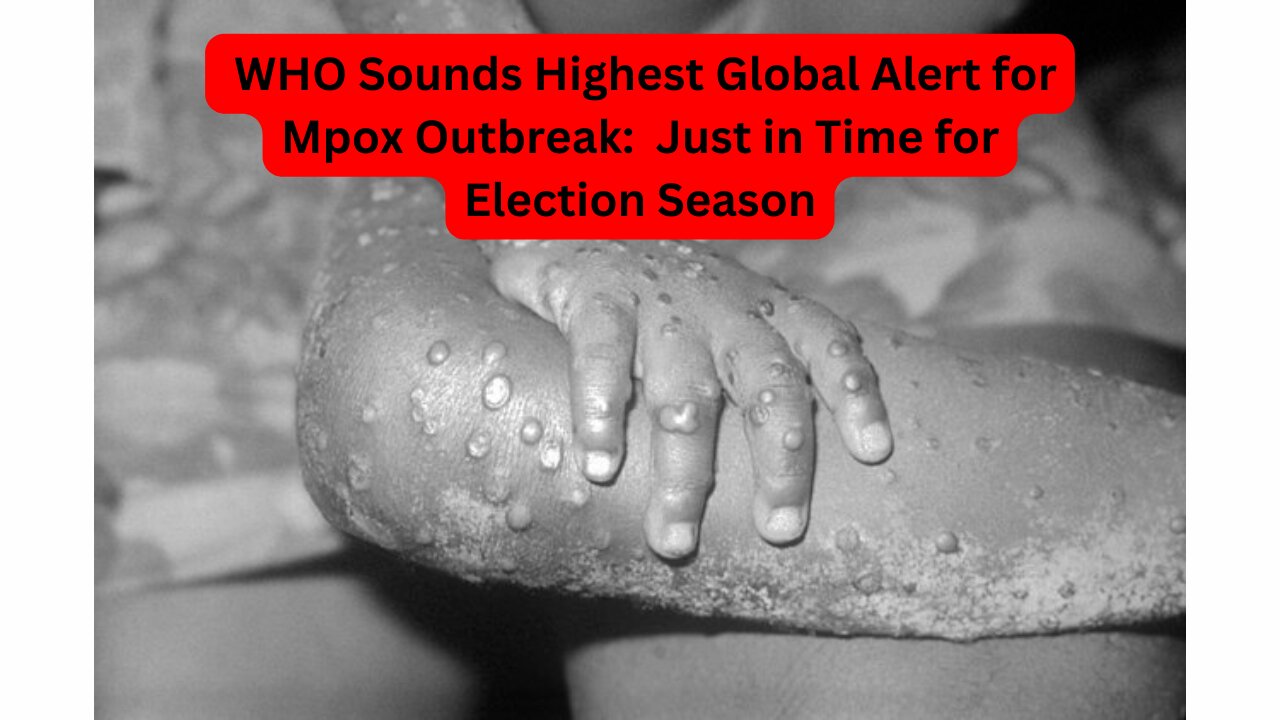Premium Only Content

WHO Declares Global Health Emergency Over Alarming Mpox Spread
On Wednesday, the World Health Organization (WHO) declared the mpox surge in Africa a global public health emergency, issuing its highest alert level due to the worsening situation.
Alarmed by the rising number of cases in the Democratic Republic of Congo (DRC) and the spread to neighboring countries, the WHO urgently convened a meeting of experts to assess the outbreak. “Today, the emergency committee met and advised me that the situation constitutes a public health emergency of international concern. I have accepted that advice,” WHO Director-General Tedros Adhanom Ghebreyesus announced at a press conference. A Public Health Emergency of International Concern (PHEIC) is the highest level of alert under the International Health Regulations, which are legally binding for 196 countries.
“The emergence and rapid spread of a new clade of mpox in eastern DRC, its detection in neighboring countries that had not previously reported mpox, and the potential for further spread within Africa and beyond is deeply concerning,” said Tedros. “A coordinated international response is crucial to stop these outbreaks and save lives. This is a matter of global concern.”
New Troubling Subclade
The WHO's decision follows the African Union’s health watchdog declaring its own public health emergency over the growing outbreak. Tedros highlighted that more than 14,000 cases and 524 deaths reported in the DRC this year have already surpassed last year's total.
“The rapid spread of clade 1b in the DRC, which seems to be spreading mainly through sexual networks, and its detection in neighboring countries such as Burundi, Kenya, Rwanda, and Uganda, is particularly alarming,” Tedros stated.
Dimie Ogoina, who chaired the emergency committee, said that all 15 members agreed that the mpox surge was an extraordinary event. Many feared that the known cases in Africa might be “just the tip of the iceberg,” as a lack of robust surveillance prevents a complete understanding of the situation. Maria Van Kerkhove, the WHO’s director for epidemic and pandemic preparedness and prevention, emphasized, “We can stop the transmission of mpox with a concerted effort.” However, she noted that experts need “a much better understanding of the epidemiology” and transmission patterns to ensure that the limited vaccines are deployed effectively. WHO immunization experts recommend two vaccines for mpox.
PHEIC Status
Previously known as monkeypox, the virus was first identified in humans in 1970 in what is now the DRC. Mpox is an infectious disease caused by a virus transmitted to humans by infected animals, though it can also spread from human to human through close physical contact. Symptoms include fever, muscle aches, and large boil-like skin lesions.
This is the second PHEIC related to mpox, but it focuses on a different and more deadly strain of the virus. In May 2022, mpox infections surged worldwide, primarily affecting gay and bisexual men due to the clade 2b subclade. The WHO declared a public health emergency that lasted from July 2022 to May 2023. That outbreak, which has now largely subsided, resulted in around 140 deaths out of 90,000 cases. The clade 1b subclade, which has been spreading in the DRC since September 2023, causes more severe disease and has a higher fatality rate than clade 2b.
Preparation and Resources
A PHEIC has only been declared seven times since 2009, including for H1N1 swine flu, poliovirus, Ebola, Zika virus, Ebola again, COVID-19, and mpox. Marion Koopmans, director of the Pandemic and Disaster Management Centre at Erasmus University Rotterdam, noted that a PHEIC declaration raises global awareness. However, she emphasized that “the same priorities remain: investing in diagnostic capacity, public health response, treatment support, and vaccination,” warning that this would be challenging due to the lack of resources in the DRC and its neighboring countries.
The International Federation of Red Cross and Red Crescent Societies (IFRC) announced that it is scaling up preparedness measures across Africa, particularly in the heavily affected eastern DRC. With its extensive network, the IFRC is prepared to “play a crucial role in containing the spread of the disease, even in hard-to-reach areas where the need is greatest.”
-
 3:59
3:59
Conspiracy Chronicle
22 days agoRadioactive Shipment Disappears in New Jersey—Are Drones on the Hunt?
1241 -
 53:07
53:07
Candace Show Podcast
2 hours agoBlake Lively VS Justin Baldoni: The Revenge of #MeToo | Candace Ep 128
45K42 -
 1:59:04
1:59:04
Darkhorse Podcast
5 hours agoThe 259th Evolutionary Lens with Bret Weinstein and Heather Heying
31.7K18 -
 1:42:19
1:42:19
Film Threat
4 hours agoHOLLYWOOD IS ON FIRE! | Hollywood on the Rocks
10.3K1 -
 9:53
9:53
Gun Owners Of America
4 hours agoConstitutional Concealed Carry Reciprocity Introduced to Congress!
27.6K8 -
 1:52:31
1:52:31
The Quartering
5 hours agoTrump Hotel Attack Planned With ChatGPT, Wildfires Rage & Liberals Celebrate, Biden Roasts Kamala!
74.2K31 -
 12:51
12:51
Chef Donny
4 hours agoTossing Coach Jon Gruden A Caesar Salad | What's For Lunch
25.8K1 -
 1:30:57
1:30:57
Mally_Mouse
4 hours agoLet's Yap About It - LIVE!
17.1K10 -
 1:36:33
1:36:33
Steve-O's Wild Ride! Podcast
6 days ago $0.56 earnedSteve-O’s Niece Reveals What Kind Of Uncle He Is - Wild Ride #249
20K6 -
 LIVE
LIVE
Viss
5 hours ago🔴LIVE - Vissrespect Delta Force Duo Dominance! Viss w/ Dr Disrespect
322 watching